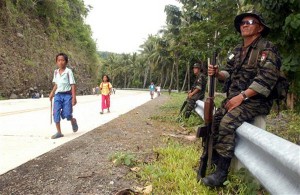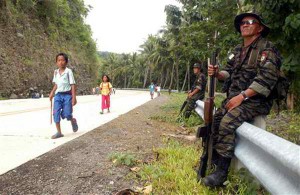By IBARRA MATEO
 HEALTH Secretary Enrique T. Ona appealed for a ceasefire in conflict-stricken areas in the country to ensure the safety of about 40,000 health workers who will vaccinate an estimated 18 million Filipino children during the 20-day nationwide door-to-door campaign to combat measles that started yesterday.
HEALTH Secretary Enrique T. Ona appealed for a ceasefire in conflict-stricken areas in the country to ensure the safety of about 40,000 health workers who will vaccinate an estimated 18 million Filipino children during the 20-day nationwide door-to-door campaign to combat measles that started yesterday.
“The main objective of the campaign is to reduce the number of susceptible children that have piled up since we last conducted a nationwide campaign in 2004,” Ona said Monday during the launch of the P600-million “Iligtas sa Tigdas ang Pinas” vaccination campaign.
Vaccination teams, composed of medical doctors, nurses, midwives, and barangay health workers, will knock in every house all over the country from April 4 to May 4, 2011, 8 a.m. to 5 p.m., Monday to Friday, to immunize children from 9 months to 8 years old.
Ona said: “Palagi naman po tayong humihingi ng ceasefire. Hindi lamang para sa bakuna. Ipinapaalam po natin sa kanila (military and rebel groups) na mayroon po tayong programang ganito, not only for the safety of the bakunadors, but for their assistance sa mga health workers. (We always appeal for a cessation of hostilities. Not only for this vaccination campaign. We would like to inform them (military and rebel groups) that we have this (anti-measles and anti-German measles) program, not only for the safety of the vaccination teams, but for their assistance to health workers).”
The Department of Health (DOH) is advising parents to allow the immunization of their eligible children even if they have already been vaccinated against measles and German measles, and even if they have already been infected with these communicable diseases.
The health secretary said vaccination is “the best way” to prevent measles, noting that there are still children dying from measles, even if vaccination is free and available nationwide in all health centers.
“It costs only P67 to immunize a child against measles and German measles, otherwise known as rubella,” Dr. Joyce Ducusin, national coordinator for the DOH’s Expanded Program on Immunization, said. “However, treating a child with measles and German measles and their complications may cost between P500 to P15,000.”
Measles is a highly contagious disease, which can be fatal, and is spread by coughing and sneezing, close personal contact, or direct contact with infected nasal or throat secretions.
German measles (rubella) is also a highly contagious disease characterized by flu-like symptoms followed by a rash. Immunity to measles and German measles is developed after immunization.
However, the primary danger in the case of German measles is the infection of pregnant women because it seriously threatens the life of the unborn child. Complications of German measles include miscarriage, premature delivery, and serious birth defects, such as heart problems, hearing and sight problems, cognitive impairment, and liver or spleen damage.
During the period January-March 19, 2011, the DOH National Epidemiology Center recorded 2,075 measles cases nationwide, with the persons infected ranging from 8-day-old babies to 85-year-old adults. Of these cases, five deaths have been recorded.
The number of confirmed measles cases significantly increased from 453 in 2007 to 1,418 in 2010, the DOH said. Of the total confirmed cases, more than 70 percent were among children who were not vaccinated against measles. There were 30 deaths recorded in 2010.
The DOH started the surveillance of German measles in 2009, and since then, 1,654 confirmed cases have been recorded, involving mostly children below 9 years old.
The DOH said that nationwide mass immunization campaigns, such as the “Iligtas sa Tigdas ang Pinas,” have better coverage of target audience compared to the expanded immunization program available at various health centers all over the country.
Anti-measles campaigns held in 2004 and 2007 covered about 95 percent of their targets, levels never achieved by the DOH’s regular immunization programs. The 95-percent coverage prompted the DOH to implement the 2011 door-to-door strategy to combat measles and German measles.
The DOH is supported by the World Health Organization (WHO) in this year’s anti-measles and anti-German measles drive.
“The measles-rubella vaccines are safe, effective, and inexpensive,” the WHO said.
